How HBO’s Lakers Series Ticked Off the NBA, Ended a Friendship and Became the Most Anticipated Sports Show in Decades
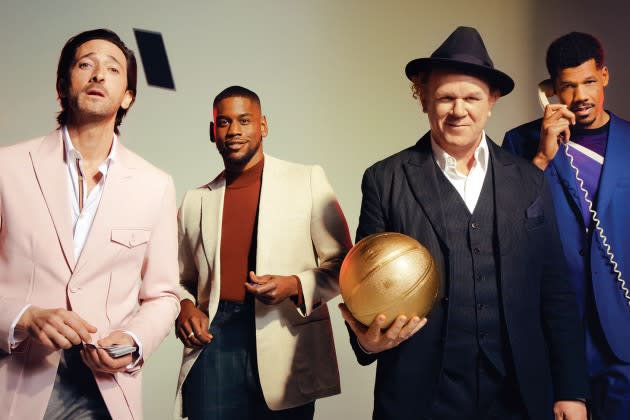
It was Easter Sunday, back in 2014, when Jim Hecht, a down-on-his-luck screenwriter, arrived at Jeff Pearlman’s door. He needed desperately to catch a break and had just flown 3,000 miles hoping one would come in the form of television rights to Pearlman’s latest best-seller, Showtime: Magic, Kareem, Riley and the Los Angeles Lakers Dynasty. His pitch was simple: He wanted to make Friday Night Lights about the 1980s Lakers. Sober for years already, he brought a bottle of nonalcoholic wine along with a block of chocolate and a big tomato, hoping to sweeten the offer, or, at the very least, to be remembered.
“I had no money, so if he’d been like, ‘$30,000,’ I would’ve been screwed,” recalls Hecht, whose résumé — then almost exclusively “talking animal movies” — offered little to convince anyone he was the guy for the job. But Pearlman’s own expectations were swirling somewhere in the basement. “By the time Jim came along, I’d probably had books of mine optioned 10 times,” says Pearlman, “and nothing ever happened.” So he let the guy who’d written an Ice Age movie shop his book around town for a year, and then another, and wasn’t remotely surprised when no one bit.
More from The Hollywood Reporter
The feedback was consistent: He’d never be able to cast Magic Johnson or Kareem Abdul-Jabbar. But Hecht wasn’t ready to give up. In late 2015, he asked Kevin Messick, with whom he’d once developed a kids’ movie, to lunch. Messick wasn’t the die-hard NBA fan that Hecht was, but he liked his idea enough to enlist his own basketball-loving boss, Adam McKay, as a producer and later as a director, and suddenly doors that were previously sealed shut came swinging open.
The Oscar-winning filmmaker behind Don’t Look Up, The Big Short and Succession set up the project at HBO, where it will make its debut with a 10-episode first season starting March 6. In between, McKay filled out the cast with a mix of newcomers like Quincy Isaiah (as Earvin “Magic” Johnson) and Solomon Hughes (Kareem Abdul-Jabbar) and such heavy hitters as John C. Reilly (as the late Lakers owner Dr. Jerry Buss), Sally Field (his mother, Jessie), Adrien Brody (Pat Riley), Jason Clarke (Jerry West) and Jason Segel (Paul Westhead); and HBO renamed it Winning Time: The Rise of the Lakers Dynasty (to avoid any brand confusion with rival Showtime). When the first teaser dropped in early December, current Lakers star LeBron James summed up the excitement surrounding the series with six fire emojis, tweeting, “Wow!!!! I can’t wait for this,” to his following of 50 million. Esquire suggested that the nearly two-minute spot — with its fast cars, fur coats and even a little basketball — might just be the greatest trailer of all time.
But the show, for which McKay and company are already prepping a second season, hasn’t been without its share of behind-the-scenes drama, including the proverbial nail in the coffin of one of Hollywood’s most fruitful friendships (more on that later). The Lakers, now run by Jerry Buss’ daughter Jeanie Buss (played by Hadley Robinson), the NBA and the athletes that Winning Time portrays — none of whom are profiting from the series, much less have any creative input — allegedly detest its very existence. League lawyers have reached out about the use of NBA trademarks and logos, HBO confirms; and at least a few associated with the Showtime Lakers era have expressed concerns about a series with no plans to whitewash the unsavory parts of NBA life. Johnson, who has his own docuseries coming to Apple TV+ in the spring, declared he’s “not looking forward to it,” and Abdul-Jabbar (a longtime THR contributor) has said “the story of the Showtime Lakers is best told by those who actually lived through it.” Both will participate in a Lakers-sanctioned docuseries being released by Hulu this year.
“We’re coming at this with good intentions, but these guys don’t know that,” says McKay, who keeps a picture saved on his phone of him with Abdul-Jabbar at a 2019 THR party. “They’re used to a certain degree of media that’s always going after them, and if I could talk to them, I’d say, ‘No, no, don’t worry, we’re going to paint the whole picture,’ but I get it, they don’t know me or [our showrunner] Max Borenstein, and it’s their right to really not like it.”
Hecht, whose Lakers fanaticism was rivaled only by Sally Field’s on the HBO production, remains hopeful that they’ll all watch and ultimately enjoy the series. As for the fuss, he shrugs: “It feels like it’ll be good for the show.”
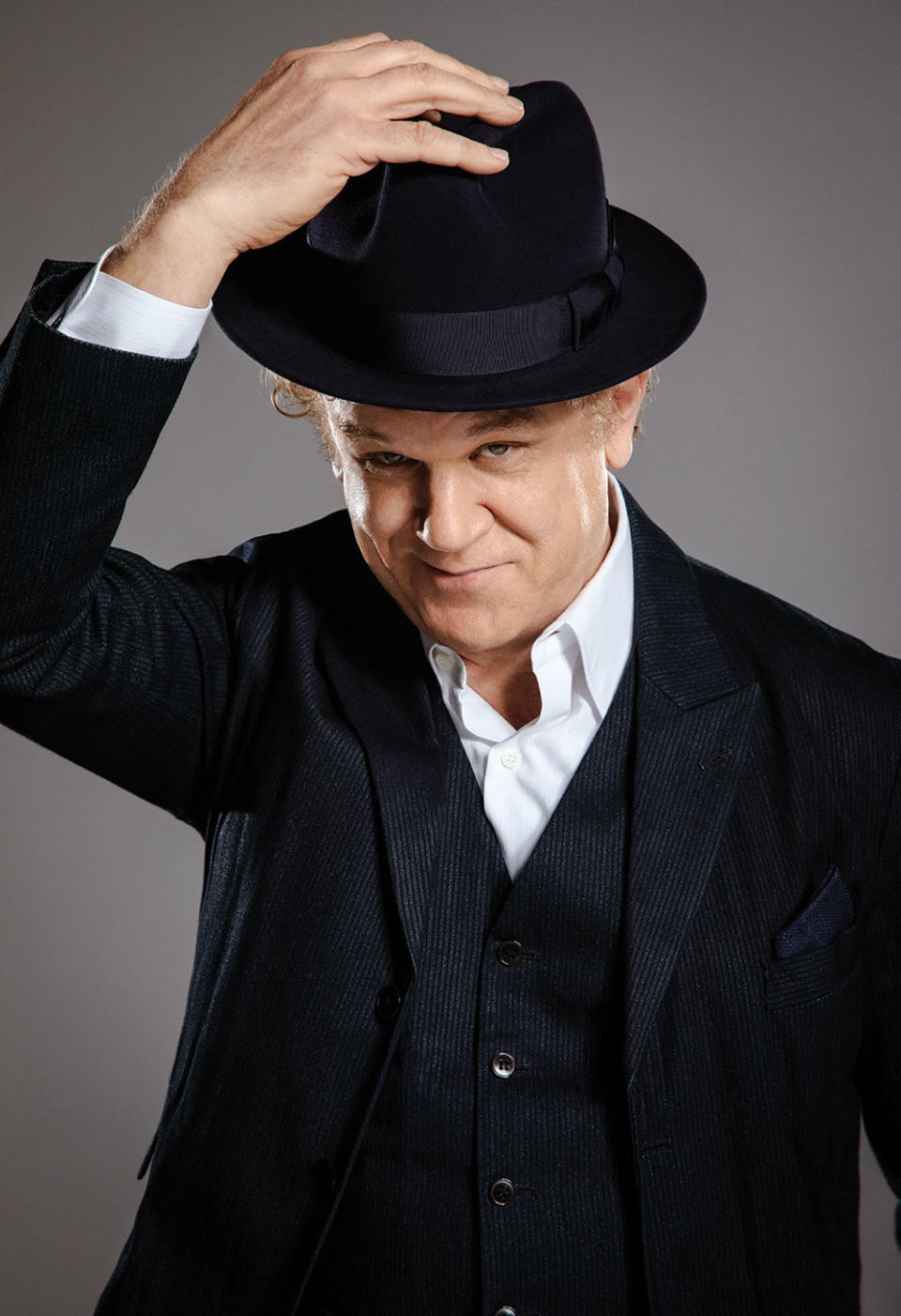
PHOTOGRAPHED BY MUNACHI OSEGBU
***
The thing about making a TV series about the Lakers in Los Angeles is that everybody seems to have an opinion, and few are interested in keeping those opinions to themselves. “I’m always like, ‘Wait a minute, I wrote the show, but they know better than me?'” says producer Rodney Barnes, who’s had plenty of friends, including Snoop Dogg, tell him what the show is about, having never seen a frame of it. “It’s almost a slight warning, like, ‘This is what it’d better be.'”
Barnes and his fellow producers are confident that the series delivers, giving audiences all of the things they know they want — “the seminal moments,” he says, “the hug between Magic and Kareem, the championships, the passes, the skyhook” — and plenty more they don’t. It begins in 1979, with Magic being drafted by the Lakers, and season one spans his and Buss’ first year with the team as they resurrected the fabled franchise, commencing one of the greatest runs the game has ever seen and in the process reshaping the sport. The phrase “Showtime” describes the team’s relentless style of play and the razzle-dazzle, sports-as-entertainment atmosphere, with Buss, equal parts huckster, playboy and visionary, the ultimate impresario. Shifting the show from a limited-series format, as HBO initially envisioned, allowed the five writers — which include Hecht — the breathing room to spend more time off the court, exploring themes of class, gender, celebrity and race (and to pack in more sex, drugs and orgies, the staples of premium TV).
“Obviously basketball is a really interesting part of it, but, and I say this as a 50-year-old gay man who’s probably been to five basketball games in my life, it’s much more a human story,” says HBO president of programming Casey Bloys, who served as an informal test of the show’s broad appeal. And to the relief of Bloys’ legal department, the most unbelievable parts of that human story — a freak accident, an unseemly death — actually happened. McKay, who has navigated controversial terrain with projects like Vice and Q: Into the Storm, dismisses any legal concerns. “We know the drill at this point,” he says. “You get the fact-checkers, you check with the lawyers, and there are very clear parameters: You’re never going to create character-defining moments; it’s always going to be within the realm of the true story.”
Early on, the writers made a unilateral decision not to engage any of the series’ central characters, save former Lakers guard Norm Nixon, with whom they’ve forged a casual relationship through his actor son, DeVaughn, who plays a younger version of him in the show. Nixon had only two notes, having visited the L.A. set: He’d never gotten a pedicure, he claimed, and he wouldn’t have worn a fur coat. (Both details remain in the show.) “For us, it was really important to have this balanced version, and we felt, and still feel, that to be beholden to any individual perspective would unbalance it,” says co-creator Borenstein, himself a lifelong Lakers fan. Even Hecht, who keeps a framed picture of himself at age 6 with Magic at a shopping mall meet-and-greet on his desk, acknowledges, “I very selfishly fantasized about [meeting them all], but I think the way we did it is probably better for the project.”
Instead, the room relied heavily on Pearlman: his 496-page book, his decades of reporting and his intimate knowledge of the game. He may have had to Google Adam McKay on their first meeting, but he knew virtually everyone involved in the Showtime era. And until the HBO series was greenlit, he’d maintained what he calls a “great relationship” with the Lakers and president Jeanie Buss. In fact, she’d twice guested at a journalism course Pearlman taught and had been complimentary of Showtime and his 2020 follow-up, Three-Ring Circus: Kobe, Shaq, Phil, and the Crazy Years of the Lakers Dynasty. But now that his work was being adapted for TV, “nobody from the Lakers will have anything to do with me,” he reveals, “and it’s a bit of a bummer.” While Pearlman had no role in the writing of the series, he was sent scripts and cuts and offered notes of the technical variety. And if you watch very closely, you can catch the back of his head in the first episode, in which he plays a reporter. (His wife and children pop up as well.)
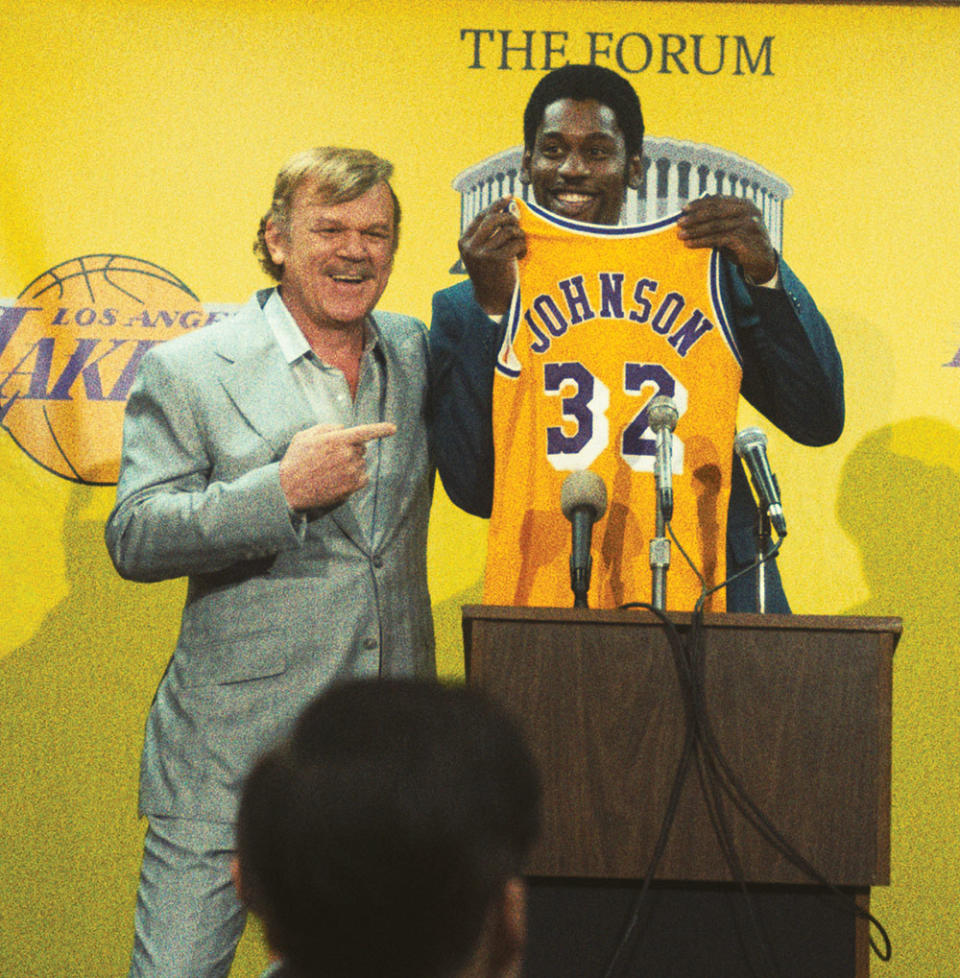
Courtesy of WARRICK PAGE/HBO
Several other insiders were brought on as consultants, including at least one person in Jerry Buss’ professional inner circle, famed “Hoops Whisperer” Idan Ravin, who once trained Kobe Bryant and Stephen Curry. Ravin not only coached the actors on the court but also watched multiple edits to be sure the series’ basketball was up to par. They also tapped former Laker Rick Fox, who spent time as a fly on the wall in the writers room, where he’d field questions about player pressures and dynamics. Hecht, who’d met Fox in his partying days, had reached out. “Jim’s a real basketball fan, but he’s never been in the locker room or on the court, and so he needed someone who’d actually breathed that type of air over the course of a career like I did,” says Fox, who was bowled over by the amount of research that was put into getting the story right.
Then it came time for casting, and before it ever began, Winning Time came dangerously close to falling apart. “I turned to Kevin Messick at one point and said, ‘We can’t do this with a subpar Magic Johnson,'” recalls McKay. “I mean, it’s him, Dr. Buss, Jeanie and Kareem, that’s the story. But the smile at the middle of it, what brought it all together, was Magic Johnson. So if we can’t get this guy, we can’t make the show.’ ”
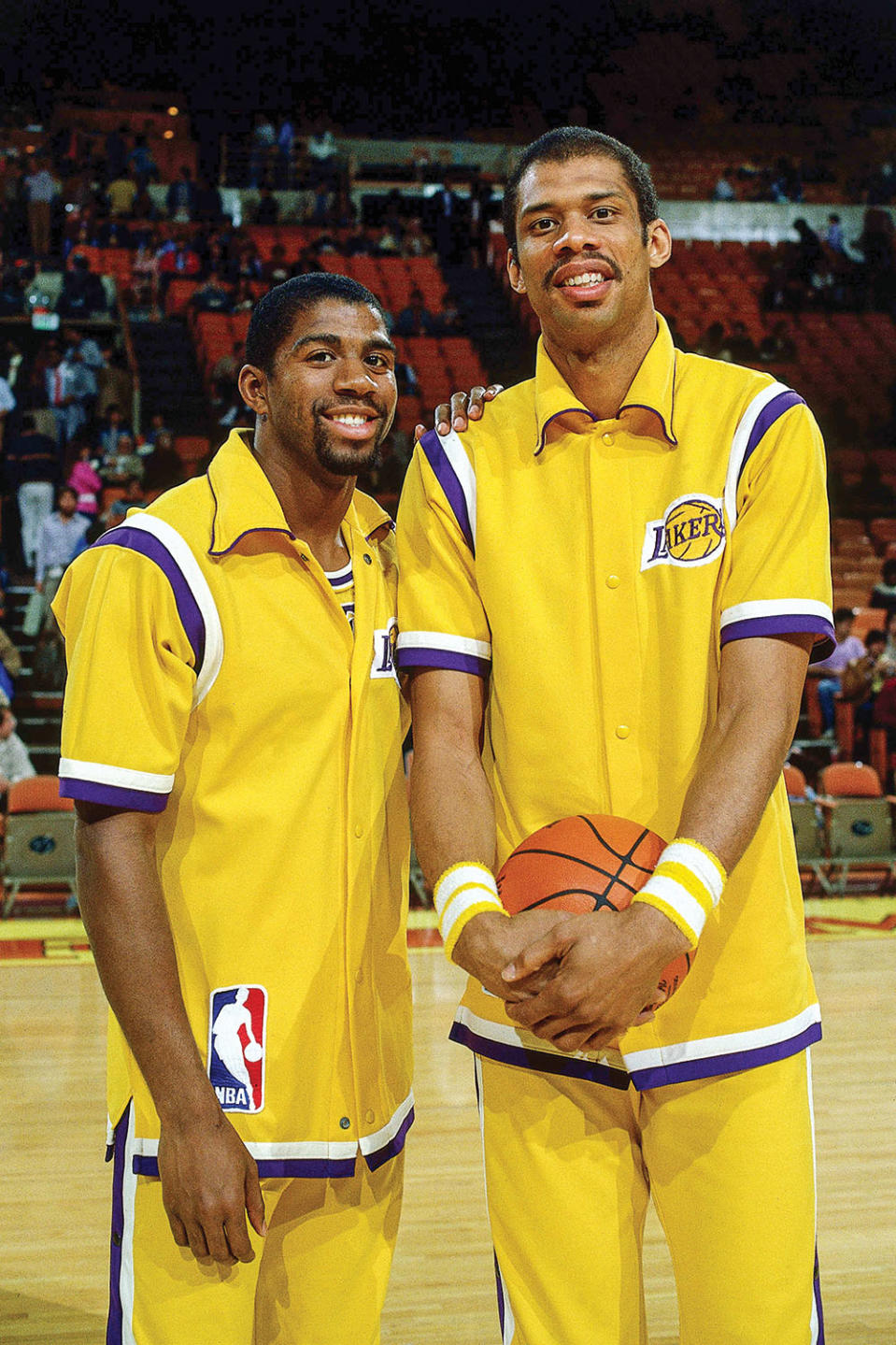
ANDREW D. BERNSTEIN/ NBAE/ GETTY IMAGES.
***
The producers saw dozens of potential Magics, and later possible Kareems, in what McKay calls the “craziest casting experience” of his career. The team had enlisted Francine Maisler, who had cast Succession and many of McKay’s movies, to track down a pair of great actors who could convincingly play basketball and bore a strong physical resemblance to hugely iconic stars. And in the case of Magic, one also who oozed charisma.
None made the hair on the back of their necks stand up until a tape came in from Quincy Isaiah, a native of Michigan, like Magic, with no IMDb résumé to speak of. McKay watched it in his office and shouted, “That’s him!” He brought Isaiah in for a callback, for which the newcomer tore through Pearlman’s book, and, later, a basketball audition with Fox, who worked the 6-foot-3 actor so hard he nearly threw up. That had been the goal. “I wanted to see how bad he wanted it,” says Fox, who ran the former college football player through an hour-plus of drills, waiting for any sign of quit. “He’d lean over and grab his shorts, and then he’d see me looking, and he’d stand up quickly and pop that smile like only Magic would. I remember turning to Max and Jim at the end, like, ‘Whoa, this kid’s got it.’ ”
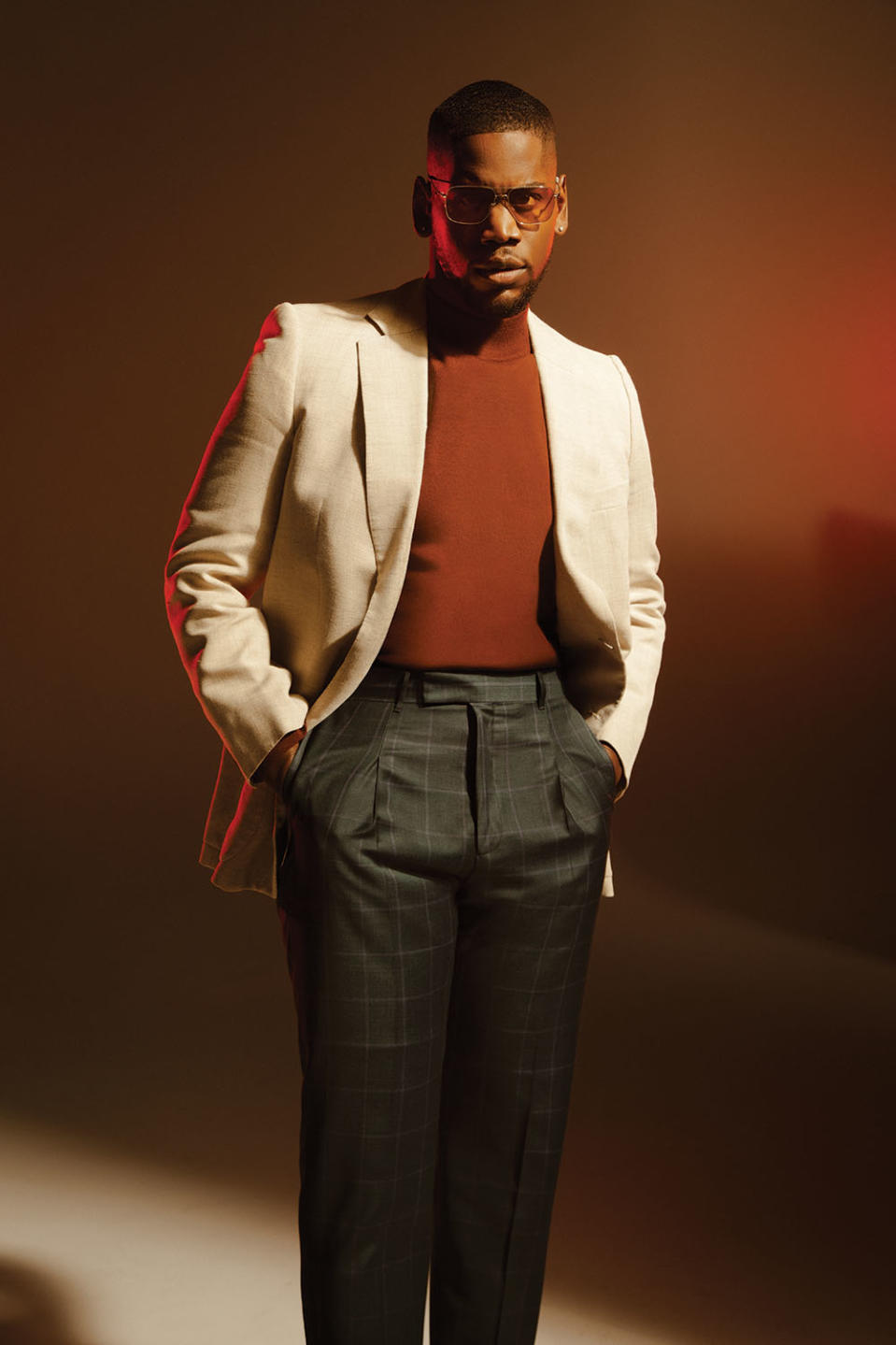
PHOTOGRAPHED BY MUNACHI OSEGBU
Not long after, McKay called to say he’d landed the part, at which point Isaiah did what anyone in his position would do: He hit mute and screamed at the top of his lungs. Then he called his mom, who shouted just as loudly. Soon, Isaiah was spending several hours a day training with Ravin and his co-stars. In whatever spare time was left, he devoured everything he could on Magic: his books, his game footage, his favorite music (including Earth, Wind & Fire, Hall & Oates and The Supremes), anything to try to tap into his psyche. People around the actor seemed to think he’d get to meet the real guy, but it hasn’t happened, and Isaiah has tried to put it out of his head. “I just didn’t want to get too hung up on it and psych myself out,” he explains. “Because this thing that we do [as actors] is a mind game, and the slightest thing can throw off your rhythm.”

PHOTOGRAPHED BY MUNACHI OSEGBU
Finding their Kareem was every bit as challenging — and in some ways more so. “Kareem’s one of the most complex and interesting people in American history,” says McKay, who was desperate to get his unique combination right. “He’s the all-time leading scorer in the NBA, he’s a voice for a people and a movement, a writer, a thinker and a jazz aficionado.” He’s also 7-foot-2. Nobody they saw was quite right. Then Maisler’s office came across Hughes, a 6-foot-11 Ph.D. in higher education who’d played basketball for the Harlem Globetrotters — he seemed almost too good to be true. In fact, Hughes was sure he was being punked when an actor buddy with whom he’d played basketball at Berkeley told him about the opportunity.
Hughes had harbored aspirations of being an actor for decades; but after a postgrad stint in L.A. didn’t pan out, he played with the Globetrotters and then settled in academia. He’d just wrapped up a gig at Stanford when he landed the role, which he treated as he would any other research project: studying Kareem’s game, his broader interests and his published works. Unlike Isaiah, he also reached out to the man he’d be portraying, via Abdul-Jabbar’s manager, who swiftly shut down any possibility of the two connecting. Hughes, who shed 25 pounds and perfected his famed skyhook, has since made peace with the response.
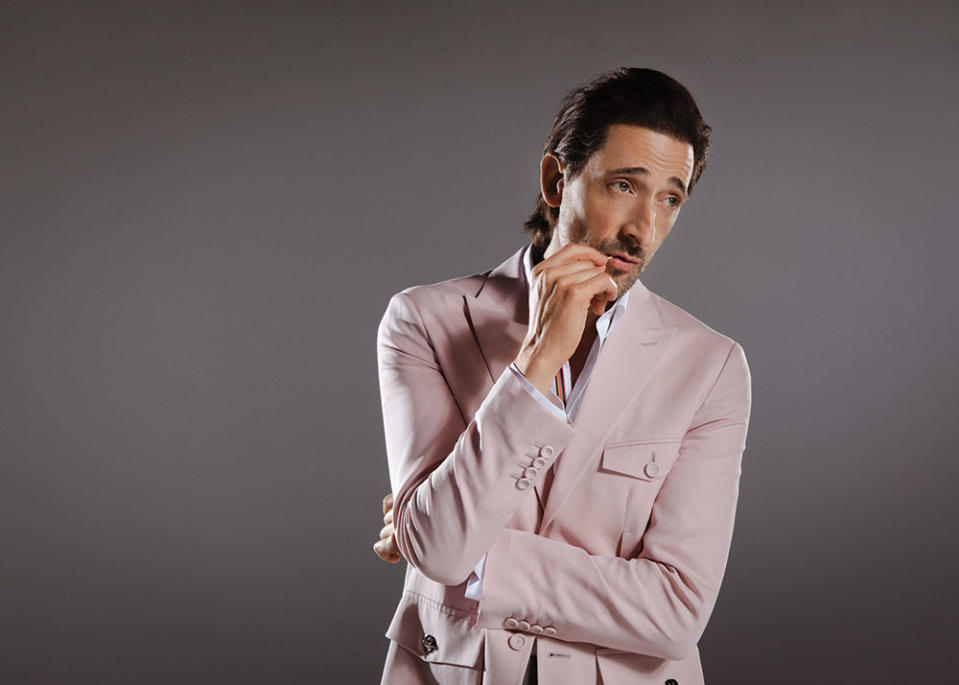
PHOTOGRAPHED BY MUNACHI OSEGBU
The part of Dr. Buss, the team’s larger-than-life owner, who opens the series espousing the virtues of sex and basketball with a topless coed in his bed, was supposed to be considerably easier to cast. McKay’s then-partner and best pal Will Ferrell, a Lakers megafan, is said to have really wanted the role. And though McKay acknowledges that when the project first came up, “there was some discussion of who will play who,” once he got the pilot script in spring 2019, he tapped Boardwalk Empire’s Michael Shannon. He’d known Shannon for some 25 years — he and McKay’s wife, director Shira Piven, had worked together back in Chicago — and he loved the idea of showcasing the actor’s wickedly funny side. “And Will was good with it,” he says of the decidedly different casting choice. But soon it would become clear it wasn’t working.
“It really bugged Michael that we were breaking the fourth wall,” says McKay, referring to the direct-to-camera format for which the filmmaker is now well-known. “He kept saying, ‘I don’t like this. It throws me. I’m having a hard time.'” Then, about a week before the pilot was scheduled to shoot, and shortly after McKay and Ferrell had dissolved their 25-year creative partnership, Shannon dropped out. The project, which moved with McKay to his new shingle, needed a new Buss, and quickly. But rather than revisit Ferrell, McKay reached out to the actor’s Step Brothers co-star, John C. Reilly, with an offer. “I told him, ‘We’re in a weird spot here, but I’m directing the pilot and I think you’d destroy this,'” says McKay. Reilly had less than 48 hours to make a decision.
He wouldn’t need it. “I’d been sitting at my kitchen table, thinking, ‘Man, I’m dead in the water, all this work, 80 movies, and I got nothing going on,’ when I got the text from Adam,” recounts Reilly, who says it took him all of two hours to read the pilot script and sign on. The role was an opportunity to reunite with McKay, one his closest friends and biggest supporters, and the more that he read, the more he understood and felt defensive of Buss. “Like, for all of his reputation for being a hedonist, he really believed in women,” says the actor, “and he gave a lot of them in his organization big starts when no one else was doing that.” The fact that the late owner hadn’t written a book or doled out too many interviews meant that Reilly would have some freedom within the role, too, though he made a point not to ask which of his storylines actually happened, needing to believe all of them had. He also refrained from getting too far ahead on scripts so that when the audience sees his character thinking to himself, “I’m about to lose everything,” the actor could be doing the same.
But before Reilly signed on — before he grew out his hair and his mustache and got into a physical shape that allowed him to squeeze into Buss’ tight-fitting pants — he reached out to Ferrell. Recalls McKay: “It was at this weird moment where Will and I weren’t exactly hugging each other, even though there was nothing that terrible, and he called Will and said, ‘Hey, McKay just came to me with this.’ And Will was very hurt that I wasn’t the one to call him, and I should have. I fucked up.” Reilly is more diplomatic, offering only: “Will is one of my best friends, Adam is one of my best friends, I was delighted to get the job and that’s all I really have to say.”
***
Three months after Winning Time was ordered to series, the coronavirus pandemic catapulted the world into chaos. Suddenly, a show that relied on a sprawling ensemble and packed arenas seemed almost impossible. So, as The Forum, which they’d reconstructed at L.A. Center Studios, sat frozen in time, the writers room turned its attention back to the scripts, writing and rewriting for another year. Hughes, who’d taken a gig as visiting faculty at Duke in the interim, shaved off another five pounds, as he and his basketball-playing co-stars maintained their game; and McKay set off to shoot his latest Oscar contender. By the time cameras began rolling again, in spring 2021, a dizzying array of protocols had been put in place.
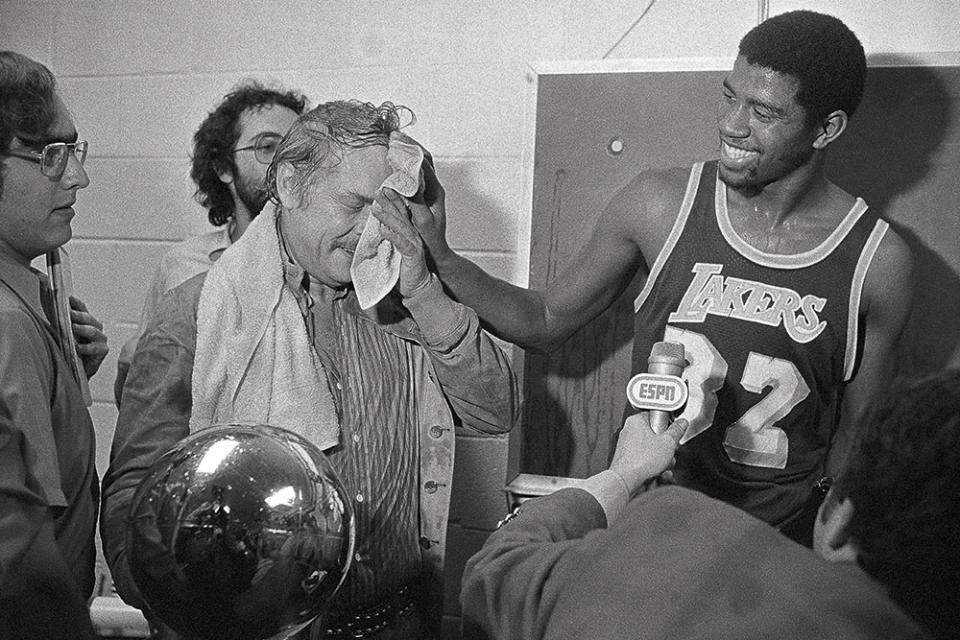
BETTMANN/GETTY IMAGES
For Field, whose own Lakers’ fandom began when her boys were young, the host of restrictions meant that she wasn’t able to catch any of the game she loved being played. “I called myself the old woman in the attic because I never got to come out of this one room,” she says, recalling how many of her scenes as Jessie Buss, Jerry’s single mother and a major influence in his life, were shot in the character’s penthouse, away from the action. “And these guys would have days and days of basketball [rehearsals and shoots], but I never got to see any of it, which was the most frustrating thing.” (Meanwhile, Field’s three sons are psyched about the series and have been pumping their mom for spoilers. “This will probably be one of the few projects of mine that they’ll watch,” says the two-time Oscar winner.)
As Winning Time’s premiere looms, HBO is pulling out all the stops to market it. The network shelled out millions for a well-timed Super Bowl spot and then sent its stars to Cleveland for NBA All-Star Weekend, where it hosted a special screening and afterparty — all as the league itself has opted not to engage in any way outside of the legal correspondence that Bloys characterizes as “lawyers doing what they do.” Contacted for this article, a rep for the Lakers said, simply, “We have no comment as we are not supporting nor involved with this project.” Johnson and Abdul-Jabbar declined to comment as well. Still, everyone involved with the series seems genuinely hopeful that those depicted will enjoy what they see, and at least a few seem reasonably confident that they will. “I see it as a celebration of that era, and I think it’s freakin’ great,” exclaims Fox, though he says he’s yet to discuss the project or whatever concerns exist with other former Lakers.

Rich Pilling/NBAE via Getty Images
Adrien Brody, who scored the part of Pat Riley after one of his reps sent a savvy email to the producers with side-by-side shots of the Oscar winner and the iconic coach looking remarkably similar, offers a more nuanced perspective: “Everything is done with such a love and sense of respect for these people, but it would be challenging to watch someone depict your life or a period of your life, if you’re well beyond it, and so I’m sensitive to that.” In recent weeks, there had been some spirited debate among the producers and HBO about whether to invite some subsection of the people portrayed to watch before the rest of the world does, but ultimately they’ve decided to let it just roll out as planned.
In the meantime, the writers are back in the room plotting out season two, which hasn’t been given a formal green light, but one seems likely to come soon. What initially was envisioned to conclude with Magic’s HIV announcement in 1991 now seems open-ended. “If the stories are there and the different eras are there, why not keep exploring it?” says Bloys, whose network has quietly optioned Pearlman’s follow-up, which takes readers through the Kobe Bryant and Shaquille O’Neal era of the Lakers. Pearlman himself has relocated to Southern California and, on the back of Winning Time, landed a deal to write his first screenplay, about a fictitious school shooting. And Hecht, whose fortunes also changed on Pearlman’s doorstep all those years ago, is happily married for the first time, with a created-by credit on one of the most anticipated shows on television. He also recently celebrated 20 years of sobriety with a party that included members of Winning Time’s cast and crew. Pearlman arrived with a bottle of nonalcoholic wine, a block of chocolate and, yes, a big tomato, the only gift that made sense.
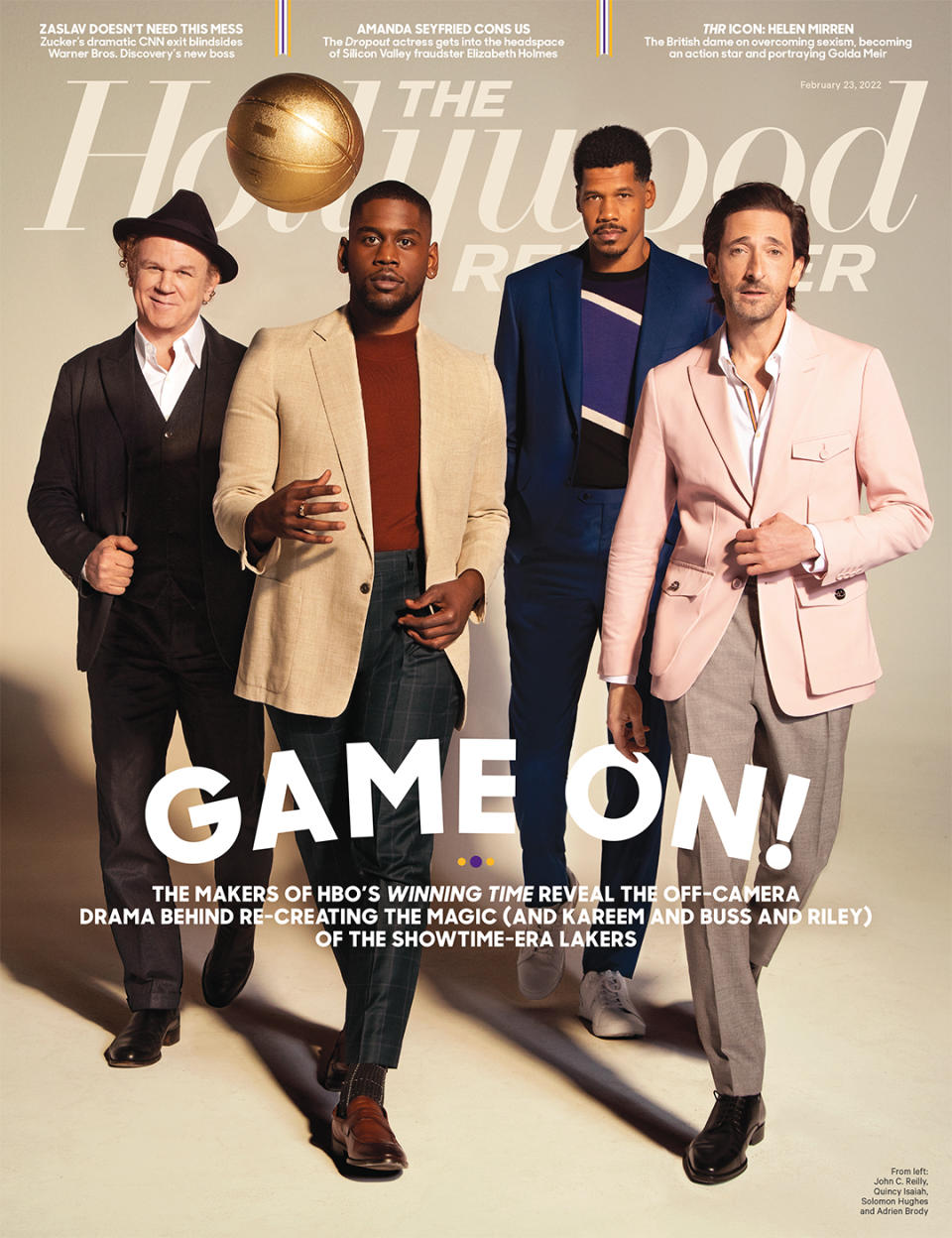
This story first appeared in the Feb. 23 issue of The Hollywood Reporter magazine. Click here to subscribe.
Best of The Hollywood Reporter


